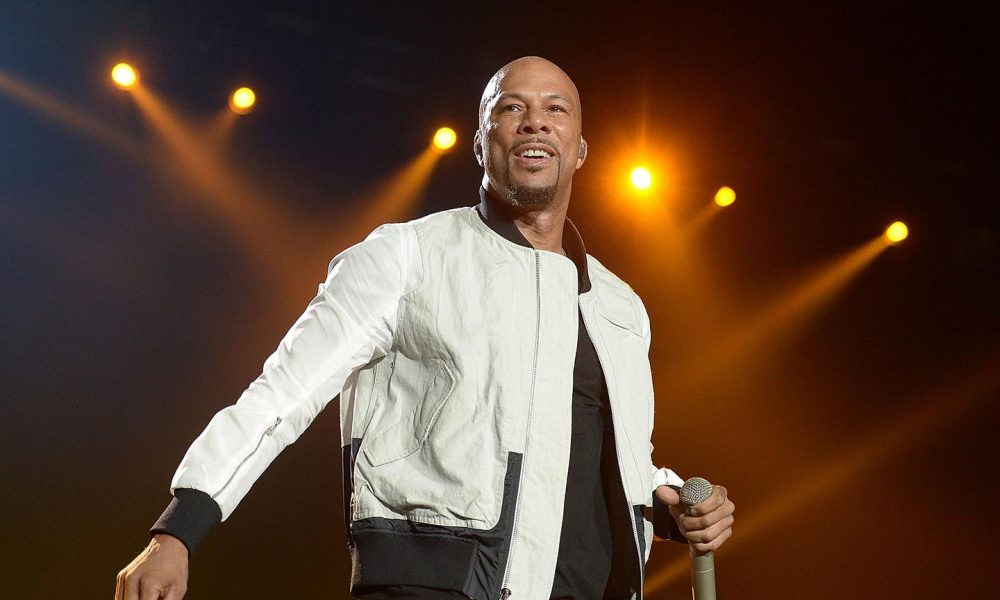 Common performing live, highlighting his energetic stage presence and connection with the audience
Common performing live, highlighting his energetic stage presence and connection with the audience
Common stands as a towering figure in hip-hop history. Hailing from Chicago’s South Side, he emerged during a pivotal time in the genre, as the East and West Coast rivalry dominated headlines. Since his groundbreaking debut album, Can I Borrow a Dollar? in 1992, Lonnie Corant Jaman Shuka Rashid Lynn, known to the world as Common, has built an impressive body of work. His discography is a testament to his artistry, filled with experimental and uplifting albums, alongside a collection of thought-provoking singles that solidify his place among hip-hop’s elite. For anyone seeking to understand the breadth and depth of conscious and poetic hip-hop, exploring the best Common Songs is essential.
Beyond his musical achievements, Common’s impact extends into acting, activism, and authorship. He’s garnered widespread recognition for his songwriting, earning an Emmy, a Grammy, and an Oscar – a rare trifecta that speaks volumes about his artistic evolution and versatility. Yet, at his core, Common remains the compelling lyricist from Chicago, consistently delivering rhymes that resonate with authenticity and insight.
Listen to the best Common songs on Apple Music and Spotify.
20: One-Nine-Nine-Nine (featuring Talib Kweli and Sadat X)
“One-Nine-Nine-Nine” is a standout track from the Rawkus Records compilation Soundbombing II, embodying the underground hip-hop spirit of the late 90s. Featuring an intro by Talib Kweli, a verse from Sadat X, and soulful production by Hi-Tek, this song is vintage Common. During his Rawkus affiliation, Common showcased his lyrical prowess and sharp delivery. This collaboration is a prime example, with Common’s verses displaying both his lyrical dexterity and his socially conscious edge. The raw energy and lyrical focus of “One-Nine-Nine-Nine” make it a crucial listen for understanding Common’s early impact.
19: Ghetto Dreams (featuring Nas)
“Ghetto Dreams” marked a long-awaited collaboration between two of hip-hop’s most respected MCs, Common and Nas. Appearing as the lead single from Common’s ninth album, The Dreamer/The Believer, this track delivers a potent dose of 90s boom-bap nostalgia, thanks to No I.D.’s hard-hitting production. Sampling The Fellows’ “Let’s Make It Last,” both lyrical titans reflect on their upbringing in challenging environments and how dreams can materialize against all odds. This legendary duet is a testament to the enduring power of storytelling in hip-hop and the shared experiences of two icons.
18: Take It EZ
“Take It EZ” served as Common’s (then known as Common Sense) introduction to the global hip-hop scene. As the debut single from Can I Borrow a Dollar?, it was instrumental in establishing Chicago as a burgeoning hub for underground hip-hop. Produced by No I.D., “Take It EZ” showcased Common’s laid-back flow and introspective lyrics, hinting at the greatness that was to come in his career. This track remains a foundational piece in the best Common songs catalog, capturing the raw talent of a young artist on the cusp of stardom.
17: Universal Mind Control (featuring Pharrell Williams)
Inspired by Afrika Bambaataa’s iconic “Planet Rock,” “Universal Mind Control” saw Common explore a more dance-oriented and less overtly political side of his artistry. Produced by The Neptunes and featuring Pharrell Williams on the catchy chorus, this track marked a departure from the soul-sampling sounds of his previous work. Instead, it embraced a futuristic, electronic vibe, demonstrating Common’s versatility and willingness to experiment. “Universal Mind Control” became one of his highest-charting singles, proving his ability to innovate while maintaining his core appeal.
16: Come Close (featuring Mary J Blige)
Within the experimental landscape of Common’s 2002 album, Electric Circus, “Come Close” emerged as the album’s sole radio single. This unabashed rap ballad and R&B crossover track features the Queen of Hip-Hop Soul, Mary J. Blige, on the chorus, revealing a more vulnerable and romantic side of Common. “Come Close” even served as a public marriage proposal to his then-girlfriend, Erykah Badu, adding a personal layer to its already tender sentiment. The song’s smooth blend of rap and R&B sensibilities made it a standout track in Common’s discography.
15: They Say (featuring Kanye West and John Legend)
“They Say” from the critically acclaimed album BE is a powerful collaboration between Common, fellow Chicago native Kanye West, and John Legend. This triumphant anthem serves as a rejoinder to naysayers and doubters, radiating aspiration and inspiration. Among Common and Kanye’s numerous collaborations, “They Say” perfectly encapsulates the unique chemistry between these two Chicago veterans who have significantly shaped the landscape of hip-hop. The track’s uplifting message and stellar performances make it a fan favorite.
14: Letter To The Free (featuring Bilal)
Following their Oscar-winning collaboration on “Glory” for Ava DuVernay’s film Selma, Common and the director reunited for her documentary 13th. “Letter To The Free” is a passionate and politically charged song created for the film’s soundtrack. Addressing the mass incarceration of African Americans, Common continues the tradition of African-American protest music with this powerful track. Produced by Karriem Riggins and Robert Glasper, and featuring Bilal’s distinctive vocals, “Letter To The Free” earned Common an Emmy, further solidifying his artistic achievements beyond music.
13: The Bizness (De La Soul, featuring Common)
Common’s musical lineage connects him to the Native Tongues collective, making his collaboration with the legendary De La Soul on “The Bizness” a significant moment. This track sees the MCs taking aim at uninspired rappers and the overemphasis on materialism within hip-hop, advocating for artistic integrity and pushing the culture forward. Appearing alongside De La Soul on “The Bizness” affirmed Common’s status as a major force within conscious hip-hop. This collaboration is a nod to hip-hop’s roots and a call for authenticity.
12: Act Too (The Love Of My Life) (The Roots, featuring Common)
From The Roots’ seminal album Things Fall Apart, “Act Too (The Love Of My Life)” is a continuation of the themes explored in Common’s 1994 classic, “I Used To Love H.E.R.” Trading verses with Black Thought, another elite MC, Common critiques the commercialization of hip-hop and its perceived decline in creativity and substance. This track is a powerful commentary on the state of hip-hop, delivered with lyrical finesse and sharp observations by two of the genre’s most thoughtful artists.
11: Testify
“Testify” showcases Common’s exceptional storytelling abilities in a gripping narrative of crime and betrayal. Built around a sample from Honey Cone’s “Innocent Til Proven Guilty,” masterfully looped by Kanye West, “Testify” unfolds a tale of heartbreak and deceit set against a soulful 70s groove. Accompanied by a compelling music video starring Taraji P. Henson, the single earned a Grammy nomination for Best Rap Solo Performance, highlighting Common’s captivating delivery and narrative depth.
10: Respiration (Black Star, featuring Common)
“Respiration” is a landmark collaboration featuring the “Holy Trinity” of late 90s underground rap: Mos Def, Talib Kweli, and Common. Featured on Mos Def and Talib Kweli Are Black Star, this six-minute track provides each MC with a platform to paint vivid portraits of urban life’s harsh realities. “Respiration” stands as a pinnacle of lyrical artistry, showcasing the combined talents of three of hip-hop’s most gifted wordsmiths. The song’s intricate verses and socially conscious themes make it a timeless classic.
9: Go! (featuring John Mayer)
“Go!” delves into Common’s sensual side, applying his narrative skills to themes of intimacy and attraction. Featuring percussion by Num Amuntehu, scratches by A-Trak, production by Kanye West, and backing vocals by John Mayer, “Go!” transcends typical clichés of love songs. Its smooth groove and sophisticated lyrics make it versatile enough for both intimate settings and casual listening. This track demonstrates Common’s ability to explore diverse themes while maintaining his lyrical integrity.
8: Retrospect For Life (featuring Lauryn Hill)
In the often hyper-masculine world of hip-hop, vulnerability is not always celebrated. However, for Common, it’s just another facet of the human experience to explore. “Retrospect For Life” tackles the sensitive and complex topic of abortion, showcasing Common’s introspective and profound approach to songwriting. Featuring Lauryn Hill on the hook, Common grapples with the moral and emotional dilemmas of an unplanned pregnancy. The raw honesty and emotional depth of this 1997 single continue to resonate with listeners, highlighting Common’s courage to address challenging subjects.
7: Love Of My Life (An Ode To Hip Hop) (Erykah Badu, featuring Common)
By 2002, Common and Erykah Badu were recognized as a hip-hop power couple. Their collaboration on “Love Of My Life (An Ode To Hip Hop)” solidified their artistic synergy. Released on the Brown Sugar soundtrack, this Top 10 hit is another of Common’s lyrical tributes to hip-hop culture, a recurring theme in his work. “Love Of My Life” earned Common his first Grammy Award for Best R&B Song, showcasing his ability to blend genres and create commercially successful yet artistically meaningful music.
6: Resurrection
“Resurrection,” the title track of his breakout album, marked a pivotal moment in Common’s career, signifying the shift from Common Sense to simply Common. Over a jazzy instrumental, he delivers intricate and powerful verses, asserting his lyrical dominance and artistic vision. “Resurrection” not only set the tone for the album but also heralded a new phase in Common’s artistic journey. The track’s complex rhymes and sophisticated production established Common as a leading voice in conscious hip-hop.
5: The People (featuring Dwele)
Following the widespread acclaim of BE, Common returned with “The People,” the lead single from his sixth album, Finding Forever. His undeniable chemistry with Kanye West is once again on display, as they crafted another musical gem together. Kanye’s production subtly pays tribute to the late J Dilla, who had passed away a year prior. “The People” reaffirmed Common’s connection to his audience and his commitment to being a voice for the common man, solidifying his place as a central figure in hip-hop.
4: The 6th Sense (featuring Bilal)
Opening with Gil Scott-Heron’s iconic phrase “The revolution will not be televised,” “The 6th Sense” is a bold declaration of Common’s artistic identity and direction. Masterfully produced by DJ Premier, it stands as the only track on Like Water For Chocolate not produced by a member of The Soulquarians. In his verses, Common addresses a wide range of topics, from Afrocentricity to shifts in hip-hop culture and various social issues. As the album’s first single, “The 6th Sense” charted Common’s ongoing ascent as one of the most respected MCs in the genre.
3: The Corner (featuring Kanye West and The Last Poets)
For those who found Electric Circus too experimental, “The Corner” was a return to Common’s more grounded, street-level sound. Kanye West expertly samples “You Make The Sun Shine” by The Temprees and “What It Is” by The Temptations to create a hard-hitting track with a raw, Chicago-esque feel. The gritty sound and detailed narratives of “The Corner” evoked Common’s Resurrection era, satisfying long-time fans. Featuring The Last Poets, the track bridges hip-hop’s past and future, paying homage to its roots while forging ahead.
2: The Light
“The Light,” produced by J Dilla, features a perfectly chopped sample of Bobby Caldwell’s “Open Your Eyes.” This track became Common’s biggest hit as a lead artist. Passionately dedicated to Erykah Badu, who also appears in the music video, “The Light” embodies the essence of The Soulquarians movement – soulful, introspective, and authentic. Achieving mainstream success without compromising his artistic integrity, Common rapped about love and connection, resonating with a broad audience. “The Light” is a testament to his ability to create meaningful and popular music.
1: I Used To Love H.E.R.
Arguably one of the most significant songs in hip-hop history, “I Used To Love H.E.R.” showcases Common’s innovative storytelling by personifying hip-hop as a woman. The song is a lament for the genre he once cherished, reflecting on its increasing commercialization during the 90s. Produced by No I.D., using a sample of George Benson’s “The Changing World,” the production perfectly complements Common’s lyrical narrative. Over two decades later, “I Used To Love H.E.R.” remains a cornerstone of hip-hop, a timeless classic celebrated for its originality and insightful commentary. It stands as the quintessential example of the best Common songs, encapsulating his lyrical genius and cultural impact.


